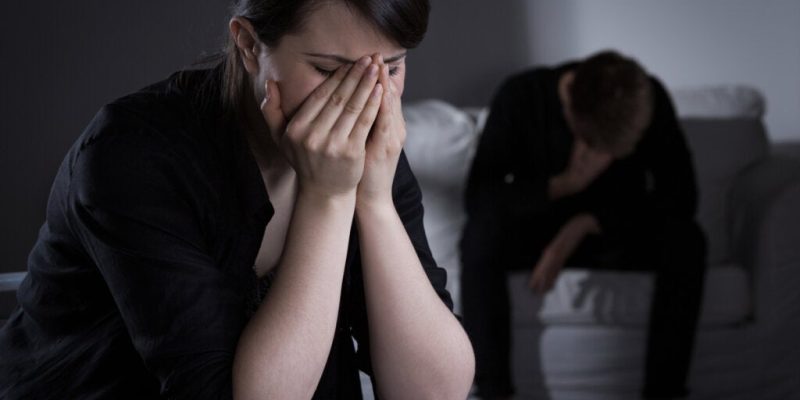The death of a loved one is a painful experience. When it happens, you feel that your life is paralyzed, and your entire emotional body aches. However, sometimes, this period is interrupted by a new loss, which only adds even more pain and demand to an already complicated situation. Indeed, overcoming cumulative grief is really challenging. You need both personal tools and external support to deal with it.
This is a situation that occurs when several loved ones are lost at the same time (for example, in an accident) or when they die consecutively in a relatively short period of time. In this context, the pain accumulates and can easily become overwhelming. In fact, if it’s not dealt with properly, it’s likely to become complicated grief. Alternatively, it may even lead to a depressive disorder.
Cumulative grief and emotional reactions
As we mentioned earlier, cumulative grief appears when you’re forced to face the consecutive deaths of several loved ones. However, there are also other types of losses that can give rise to this phenomenon. For example, it can happen if, while you’re processing the pain of death, you go through a divorce, lose your job, or experience any dramatic life change.
Grief is the natural psychological reaction to a loss. It’s the same reaction that allows you to process what happened, manage your emotions, and integrate the event in your life and move on. All of these processes require time and if, before you can finish, you face a new adverse event, the work becomes complicated.
In addition, a recent loss can reactivate another past grief that you didn’t process properly. Therefore, you might find yourself grieving for your current loss while suffering the pain of another death that happened years ago. For example, the loss of a second parent usually reactivates mourning for the loss of the first.
Whatever the case, cumulative grief generates a series of characteristic emotions that are difficult to face.
Powerlessness and lack of control
This is one of the most outstanding and overwhelming feelings. In fact, if you’re facing cumulative grief, you can feel totally powerless and defenseless in the face of a world that seems to have become hostile and unpredictable. You might also experience strong sentiments of anger and the feeling that life is unfair for treating you so badly so often.
As a matter of fact, you might feel that only bad things ever happen to you and that there’s nothing you can do to protect yourself from pain and uncertainty. To overcome this feeling of vulnerability, you need to understand that you live in a dual reality, thus both positive and negative events exist. In fact, although you can’t control what happens, you do have a certain margin of action and you can choose how you deal with the situation.
Feeling of inadequacy
Cumulative grief generates great emotional stress. That’s because you feel that enormous demands are being placed on you and you don’t have the resources to respond. If getting over one loss is hard, dealing with two at the same time can be downright overwhelming. Therefore, it’s perfectly natural to feel that you can’t move on and that you’re unable to manage the pain. However, you also have to remember that it’s just a feeling and not an immutable reality.
Guilt
One of the most characteristic phenomena that arise when facing several consecutive losses is the feeling of guilt. It seems that you feel that your most recent loss is overlapping with the oldest, occupying more of your mental space and emotional resources.
Nevertheless, it’s important to understand that this doesn’t imply that one grief hurts more than the other, or that you loved one person more than the other. It’s simply a reaction of your mind that, under its limited resources, highlights your most recent or new grief.
How to deal with cumulative grief
To overcome the accumulated pain of living through several consecutive losses, you’ll need time, self-compassion, and support. Here are some useful guidelines.
- Try to process each grief at the moment it occurs. Evading or avoiding pain is a defense mechanism. Although it may be necessary at the beginning, if it’s prolonged, it prevents you from moving forward. This leaves your pain entrenched and ready to be reactivated in the future. You should try and take charge of your emotions the moment they arise.
- Try not to rush your recovery. We all need different amounts of time to process grief and when several losses overlap, this time can increase. It’s both natural and beneficial to allow yourself to stop for a while. You need to lower your level of personal demand and attend to your sadness. After all, no one expects you to continue functioning at the same level as before. Be compassionate with yourself.
- Ask your social support network for help. Taking charge of emotional pain is a complex and demanding task, so it’s okay to delegate and rely on others for certain of your daily tasks. Let yourself be cared for and try not to isolate yourself. Indeed, social support is a good protector against complicated grief.
- Seek professional support. You don’t always have to handle everything alone. In fact, in a situation as demanding as this, having a safe space in which to express yourself and receive guidance is essential. Sometimes, those closest to you or a spiritual leader can comfort you and help you vent your feelings, but psychological help will often be necessary to work through your losses.

Cumulative grief can be overcome
Cumulative grief multiplies the pain that any loss entails and confronts you with emotions of helplessness, despair, and lack of confidence in your own resources to overcome the situation.
Therefore, it’s important to respect your rhythms, allow yourself to feel, and let yourself be helped by the immediate environment and by qualified professionals. This will prevent your natural reaction to loss from developing into a long-term mood disorder.
The post Cumulative Grief: How to Deal With Consecutive Losses appeared first on Exploring your mind.



















Comments